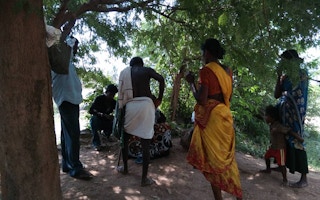More than 200 people whose families were forced from their homes in southern India by the construction of Aliyar dam in the 1960s are still trapped in bonded labour in plantations, activists said Tuesday.
A six month study by non-profit National Adivasi Solidarity Council, a network for indigenous peoples’ welfare, has identified bondage in over 30 farms and plantations in a 15 km (9 mile) radius of the dam in the southern state of Tamil Nadu.
“Most of the families were displaced during the construction of the Aliyar dam and reservoir between 1959 and 1969,” said Krishnan Kandasamy, of the council.
“They lost their homes, were never compensated and were practically driven into bondage. The state has conveniently forgotten them.”
The study states that those in bondage are from the Malasar tribal community and most families lost their land, home and livelihoods during the construction of the dam and reservoir.
The research teams gained access to the farms on the pretext of conducting medical camps or in some instances saying they were lost, and identified more than 50 families, including 73 children living in debt bondage with no access to schools.
“
They lost their homes, were never compensated and were practically driven into bondage. The state has conveniently forgotten them.
Krishnan Kandasamy, National Adivasi Solidarity Council
“They are not paid minimum wages and do not enjoy basic rights such as the freedom of movement, the freedom of choice of employment and lack of right to education for their children,” the study said.
Most of the families had been trapped in bondage to pay off debts that have come down through generations, it added.
India banned bonded labour in 1976, but it remains widespread, with millions from the marginalised Dalit and tribal communities working in fields, brick kilns, rice mills, brothels or as domestic workers to pay off debts.
The new report suggests that they may be more than 1,000 labourers still trapped in the coconut plantations, mango groves and other farms around the town of Pollachi in Tamil Nadu.
Security guards on the plantations monitor the labourers and any attempts to escape or make complaints are dealt with brutally, the report said.
In a letter to India’s National Human Rights Commission on May 29, Kandasamy has asked that the Tamil Nadu government be directed to rescue the workers and rehabilitate them.
The commission has acknowledged the complaint and said they were looking into the report.
“These people have suffered for decades. It has to stop immediately,” Kandasamy said.
This story was published with permission from Thomson Reuters Foundation, the charitable arm of Thomson Reuters, that covers humanitarian news, women’s rights, trafficking and climate change. Visit www.trust.org.










